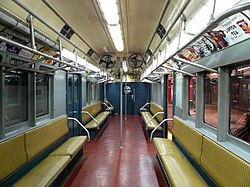R12 (New York City Subway car)
| R12 | |
|---|---|

R12 car 5760 on display at the New York Transit Museum
|
|

Interior of an R12 car
|
|
| In service | 1948-1981 |
| Manufacturer | American Car and Foundry Company |
| Built at | Berwick, Pennsylvania, USA |
| Constructed | 1948 |
| Number built | 100 |
| Number preserved | 2 |
| Number scrapped | 98 |
| Fleet numbers | 5703–5752 (Westinghouse) 5753–5802 (General Electric) |
| Capacity | 44 (seated) |
| Operator(s) | New York City Subway |
| Specifications | |
| Car body construction | LAHT Carbon Steel |
| Car length | 51 ft (15.54 m) |
| Width | 8 ft (2,438 mm) |
| Height | 11 ft (3,353 mm) |
| Platform height | 3.76 ft (1.15 m) |
| Doors | 6 |
| Maximum speed | 55 mph (89 km/h) |
| Weight | 73,100 lb (33,158 kg) |
| Traction system | General Electric 1240A3 or Westinghouse J1447C |
| Power output | 100 hp (75 kW) |
| Braking system(s) | WABCO E2 "SMEE" Braking System, A.S.F. simplex unit cylinder clasp (tread) brake |
| Track gauge | 4 ft 8 1⁄2 in (1,435 mm) |
The R12 was a New York City Subway car built in 1948 by the American Car and Foundry Company. The R12 was the first post-war city-owned rolling stock for the IRT division. These cars were very similar to the R10s, except that the R12 was smaller due to A Division specifications.
The R12s were numbered 5703-5802. The R12s were the first cars to feature electric door motors (as opposed to air-powered door motors).
There were two versions of the R12's: Westinghouse Electric-powered cars (5703-5752) and General Electric-powered cars (5753-5802).
The R12s bore several schemes during their service lives. The cars were delivered in two-tone gray scheme with orange stripes, then a solid bright red, and finally, repainted into the MTA's silver with blue stripe scheme.
Delivery of the cars began in June 1948. The first R12s began service on the 7 (IRT Flushing Line) on July 13, 1948. All 100 cars were delivered by October 1948.
The R12s ran on the Flushing Line until the arrival of the R33WFs and R36WFs in late 1963-early 1964. The R12s were then transferred to operate on other A-division routes. One particular assignment included all GE-powered cars being heavily modified (by deactivating the dynamic brakes and cutting out the third (parallel) notch on their controllers) and sent to the 8 (Third Avenue elevated line) in the Bronx during August 1969 and running there until that route's closing on April 29, 1973. In addition, four Westinghouse-powered R12 cars (5703-5706) were slightly modified for use on the Bowling Green – South Ferry Shuttle, and were so-equipped so that the center door of each car could be opened at South Ferry, while keeping the others closed. These cars were used until the shuttle was discontinued on February 12, 1977, when the cars were reassigned to the 3, since these four shuttle cars were inspected and maintained at Livonia Barn at the time, with the 3 line.
...
Wikipedia
